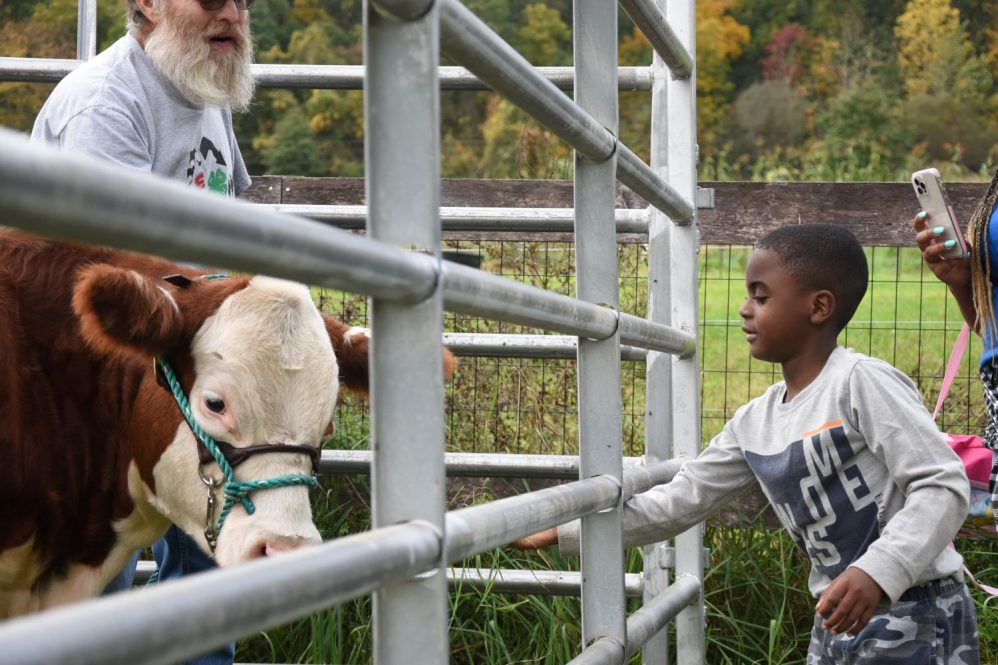During the COVID-19 pandemic, entire economic sectors were shut down. However, life on Connecticut’s dairy farms continued as normal. Without their normal outlets for sales, many dairy farms were faced with the possibility of letting thousands of gallons of milk and pounds of dairy products go to waste. That was until UConn 4-H stepped in.
In an effort named Operation Community Impact, UConn 4-H volunteers worked with partners in other UConn Extension programs and local dairies to redirect surplus to local food pantries and families in need.
“This project embodies what 4-H is all about, helping 4-H youth understand, embrace and become an active participant in community service efforts through their years as a 4-H member,” says Bill Davenport ’85 BS, ’86 MS (CAHNR).
For over a century, 4-H has been nurturing young leaders across the United States, instilling in them the values of head, heart, hands, and health; focus areas leading to well-rounded individuals. As the largest youth development organization in the country, 4-H reaches more than six million young people annually, offering programming in agriculture, STEM, leadership, civic engagement, and healthy living.
In Connecticut, UConn 4-H, part of UConn Extension, serves over 22,500 youth ages five through 19 each year through clubs, afterschool programs, school enrichment, camps, special interest activities, and efforts that respond to community needs.
In honor of National 4-H Week, UConn is celebrating the people, programs, and impact of UConn 4-H.
Hands-On Learning with Real-World Impact
What sets 4-H apart from many youth programs is its deeply experiential approach to learning. Participants don’t just read about topics, they live them. Whether they’re raising livestock, building robots, cultivating gardens, or leading service projects, 4-H members learn through civic engagement and leadership.
You know how everyone is encouraged to do STEM careers, 4-H is where you can actually try them. UConn 4-H isn’t just about agriculture; I didn’t realize all the options that were available until I got involved.
“One of my favorite aspects of 4-H is watching members build friendships with youth of all ages in an environment supported by caring and responsible volunteers; these relationships often extend well into adulthood and are deeply meaningful for strengthening communities,” says Amy Harder, associate dean for Extension at UConn.
UConn 4-H provides a plethora of events from statewide livestock project days to extensive county fairs and week camp sessions. Participants routinely develop critical thinking, project management, and interpersonal communication abilities, which are competencies that translate into academic and career success.
4-H For All
Through community partnerships and outreach, UConn 4-H serves youth from 154 of Connecticut’s 169 municipalities. Serving youth from across Connecticut. Varying program models provide opportunities for youth in urban, suburban, and rural areas to engage in UConn 4-H programs.
“With a wide variety of project areas and numerous program types, youth with a range of interests and availability can find their spark to engage in 4-H,” says Jen Cushman, state 4-H program leader and Hartford County Extension educator.
Beyond technical knowledge, 4-H focuses heavily on personal growth. Members are encouraged to take on leadership roles within their clubs and communities, from planning meetings and 4-H fairs to mentoring younger peers. The UConn 4-H State Teen Council, for example, facilitates workshops, seminars, and events that enhance statewide presence and reach.
The impact is measurable. A national study by Tufts University found that 4-H youth are four times more likely to contribute to their communities and two times more likely to be civically active than their peers. UConn 4-H’s alumni often cite their experiences in the program as transformative, helping them succeed in college and careers.
A Community of Support
At the heart of 4-H is its network of caring volunteers and mentors. UConn 4-H relies on a network of over 4,400 trained volunteers across the state who dedicate thousands of hours and expertise annually to guiding youth through projects and personal challenges.
These relationships often last well beyond a single project cycle. For many members, their 4-H leader becomes a lifelong mentor and advocate.
“Volunteering for UConn 4-H has given me the ability to pass on the knowledge and life skills I have learned throughout my time in 4-H and life to the next generation of tomorrow’s leaders,” says Tim Armbruster of Roxbury, UConn 4-H Litchfield County volunteer.
Read about how UConn 4-H robotics teams worked together to win national recognition.
Engagement for the Next Century
As Connecticut faces complex challenges the need for resilient, thoughtful leaders has never been greater. UConn 4-H is poised to meet that need by continuing to evolve its programming and reach, preparing youth to be beyond ready for work and life.
With ongoing support from UConn, community partners, and volunteers, the program is expanding its digital learning opportunities, deepening its focus on mental health and wellness, and exploring new ways to prepare youth for an interconnected world.



